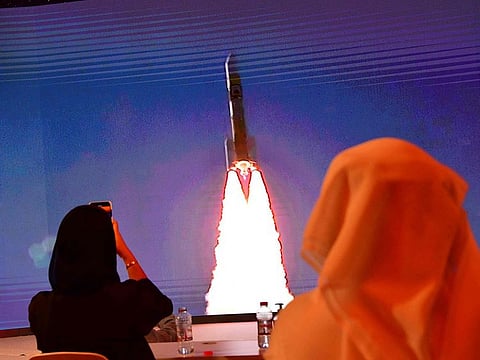Space is a final frontier for economies
Rush to carve out dominance in space will shape global pecking order of the future

Also In This Package
There are many approaches being adopted that will aid a rapid transition of the global economy to e-commerce. All of which is associated with the tremendous developments in digital technology.
There is no doubt that the new economic order emerging from this transformation will cause most economies to be restructured, and result in a new realignment of power blocs as evidenced by the current competition and tensions between the US and China. This important, yet risky, shift has gone beyond promises to practical steps.
Time is as a sword - if you don’t use the sword properly, you may hurt yourself. And time never waits for the helpless and hesitant.
In addition to the ongoing conflict between the two largest economies, in particular over domination of the digital economy and its institutions, the EU and Russia are trying to catch up with these giants. The European Commission has allocated 15 billion euros to support companies in e-commerce, and has allowed them to try out new software that would speed up these processes. This is expected to generate 325 billion euros in the current decade.
Space edge
However, the difference between the US and its competitors is great. American companies such as SpaceX and Planet Labs are the most active in this field, especially with regard to launching satellites. The former recently launched 60 satellites, taking the total number in space to 182, and is trying to reach the mark of 11,000 satellites orbiting the Earth over the next ten years.
Also Read: Space Exploration: Across the final frontier
Also Read: Emirati astronaut reaches out to Australia
Meanwhile, the other company manages 150 satellites - keep in mind the total number of satellites numbers 2,500 and will jump to 50,000 by the end of the decade.
These are all indicators that the nature of economic and trade relations will change radically. For example, internet services - the networks driving economies and life itself - will experience drastic transformations, especially after the wider activation of 5G as well as 6G in the near future.
Beaming in
Internet services are currently monopolized by telecom companies at exorbitant prices, but soon, US companies such as SpaceX will provide web services through 66 low orbit satellites and would allow subscribing to these services in any country at a nominal cost of $80 a year.
This will represent a qualitative shift in reshaping the global economy using the transformative power of e-commerce. It will be difficult to place barriers to space companies that operate through satellites and do not need licenses and land services in the countries where they can extend their services. Geographical boundaries will make no difference.
This means the transfer of wealth and jobs to countries at the top of the “space economy”, which explains the ongoing competition among small, yet technically advanced, countries.
Certainly, competition will be intense and unequal... and options will be limited. But standing idly by is completely futile. This is because there is another option, which is to have sky-high ambitions and conquer the impossible.
The situation is similar to the use of public transport, such as the metro during the morning and evening rush hours. If you stand by the side waiting to reserve a place, you will not reach your destination on time... and you will end up being dismissed.
But if your capabilities are deployed despite the crowds, you will book a place and reach your destination - on time.
- Mohammed Al Asoomi is a specialist in energy and Gulf economic affairs.









